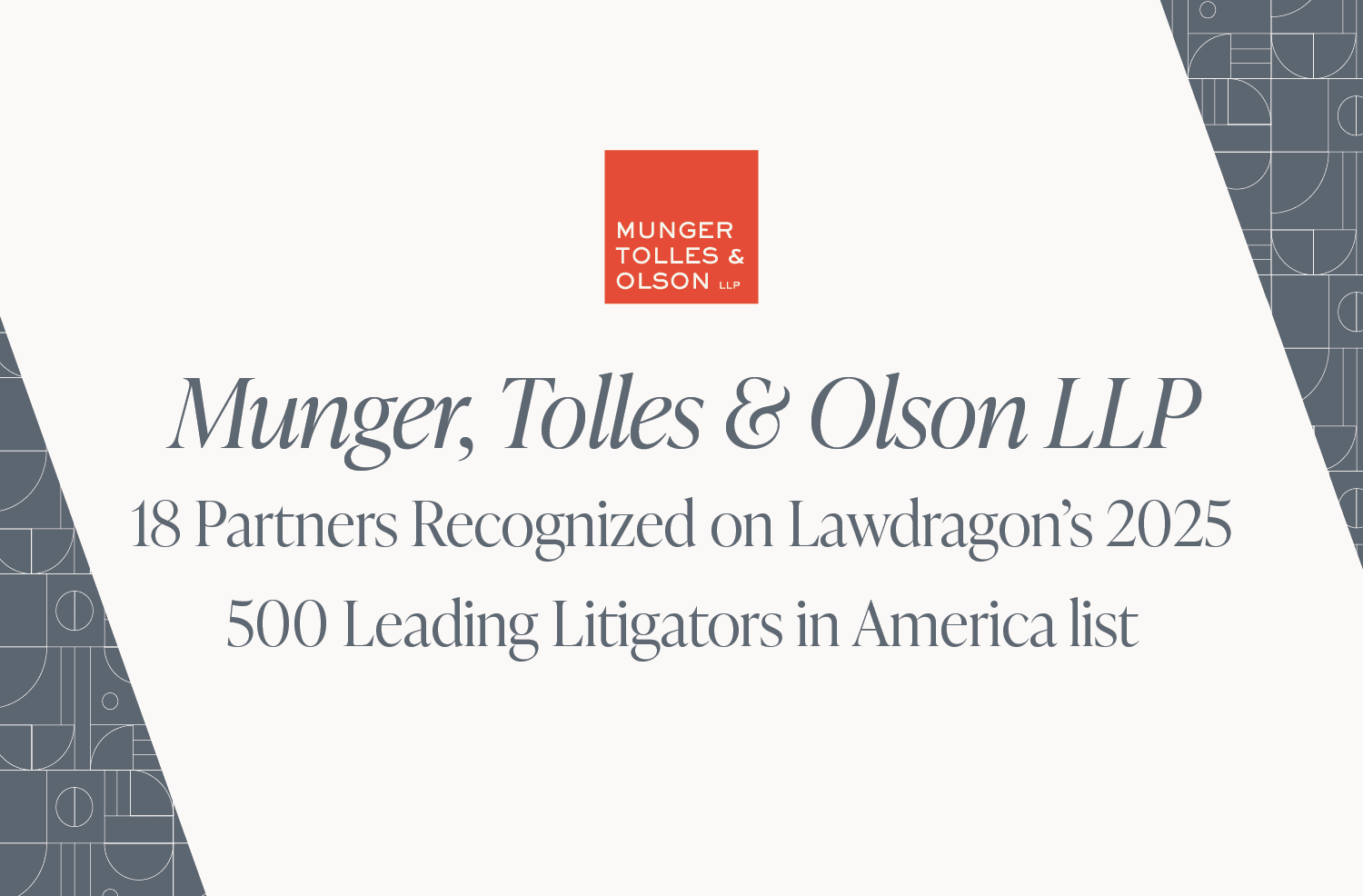Patent
Precedent-setting work in patent litigation and counseling
Munger, Tolles & Olson vigorously protects its clients’ innovations, drawing on decades of experience to guide them towards favorable resolutions inside and outside of the courtroom. Recognized by Chambers for our work in the patent sphere, we are well known for efficiently handling precedent-setting matters, particularly those at the intersection of patent, antitrust and trade secret law, and patents essential to industry standards.
Whether our clients are asserting patents or defending themselves from infringement claims, they trust us to guide cases to a successful resolution through smart, cost-effective strategies, whether that’s early motion practice, inter partes reviews and other proceedings before the Patent Trial and Appeal Board, incisively managing discovery, or messaging to opponents that we’re ready to go to trial.
Our deep bench of experienced trial lawyers have made complex patent matters clear to both judges and juries, and we have achieved numerous patent litigation victories at the Federal Circuit, as well as the most active patent litigation venues in the country, including the Northern District of California, Eastern and Western Districts of Texas, and District of Delaware. We also have appellate lawyers who specialize in practice before the U.S. Court of Appeals for the Federal Circuit and the U.S. Supreme Court.
Services
Our practice includes:
Patent Issues
- Infringement, Validity and Unenforceability
- Pre-Litigation Planning
- Transactions and Freedom to Operate
Antitrust Issues
- Standard Essential Patents and FRAND Licensing
- Sham Litigation
- Pay-for-Delay Claims
Trials and Appeals
- District Court Litigation
- Patent Trial and Appeal Board
- Federal Circuit Appeals
Clients
We represent a wide range of clients, specializing in the technology, media and entertainment, life sciences and pharmaceuticals, and industrial sectors, including:
Technology, Media & Industry
- Comcast
- Dell
- Intel
- Samsung
- Snap
Pharmaceuticals and Life Sciences
- Abbott Laboratories
- AbbVie
- Amgen
- Genentech
- Gilead Sciences
- Solvay Pharmaceuticals
- Takeda Pharmaceuticals
Team
Many of our lawyers sharpened their patent expertise as law clerks in the Federal Circuit; a number of others have advanced scientific and engineering degrees. Our attorneys include:
Related Practices
Experience
Trials and Appeals
We have won trials and summary judgments for our clients in matters involving hundreds of millions of dollars in damages and years of product development. Our work includes:
- Kite Pharma, a subsidiary of Gilead Sciences, Inc., in invalidating the plaintiff’s patents during infringement litigation over an innovative cancer therapy and defeating a claim for $1.2 billion and $500 million in annual royalties.
- Takeda Pharmaceuticals and its affiliates, in obtaining judgments of infringement and awards of injunctive relief against three companies in a bench trial over generic versions of the acid reflux drug Dexilant.
- Microsoft, Hewlett-Packard and others in winning summary judgment, successfully defended on appeal, in a suit involving software multithreading.
- Google and YouTube, in successfully challenging five asserted patents for compressing and streaming digital video, in which the court invalidated two patents, issued favorable claim constructions for two more and dismissed the last as directed to ineligible subject matter.
- Google in achieving a favorable settlement in a matter alleging Google Pay, its Android-based payment platform, infringed five patents pertaining to near-field communication (NFC) technology for mobile payments.
- Google in settling, on favorable terms, a patent infringement matter claiming that Google Nest smart speakers infringed two patents for microphone arrays that isolate and process sound in noisy environments.
- Snap, against charges it infringed the patents of social mapping application You Map and misappropriated trade secrets by signing up for a beta test of its software.
- Intel in obtaining dismissal of infringement claims brought against it in a broad litigation campaign targeting wireless networks, broadband internet providers and network equipment suppliers
- Abbott in a long-running patent licensing and trade secret dispute involving genetic amplification technology now used in COVID-19 testing, leading to a favorable settlement for the client.
- AbbVie, then part of Abbott Laboratories, in winning an en banc Federal Circuit ruling that fundamentally altered the standards for determining inequitable conduct before the U.S. Patent and Trademark Office.
- Google in setting an important precedent for obtaining mandamus relief for patent infringement matters and obtaining a critical change of venue.
- Intel, Comcast, High Tech Inventors Alliance and others, as amicus at the Federal Circuit and Supreme Court on high-profile issues ranging from the scope of appellate review over PTAB decisions to the permissibility of functional claiming.
Antitrust Matters
We have counseled pharmaceutical clients defending against claims of monopolization, “sham litigation” and “pay-for-delay” arrangements brought by competitors, federal agencies and wholesalers, including:
- AbbVie Inc. and Solvay Pharmaceuticals in a decade-long, multi-part antitrust litigation brought by wholesalers and indirect purchasers alleging “sham litigation” in patent settlements to delay the market entry of generic versions of the testosterone drug AndroGel®. Trial is expected in 2025.
- AbbVie, in obtaining a denial of class certification for third-party payers of the drug Niaspan®, who alleged that AbbVie and Teva engaged in a “reverse-payment” settlement to delay marketing of a generic version of Niaspan. The Third Circuit’s affirmance of that ruling is the leading precedent on how the Circuit’s class action ascertainability requirement applies in pharmaceutical industry litigation.
- Solvay Pharmaceuticals, now part of AbbVie, as lead counsel in the landmark FTC v. Actavis, Inc. matter, where the U.S. Supreme Court ruled that “reverse payment” patent settlements between brand-name pharmaceutical companies and generic manufacturers are not presumptively unlawful, but should be evaluated under the “rule of reason.”
- Takeda Pharmaceuticals in defeating certification of two proposed classes of indirect purchasers who alleged that Takeda’s conduct in licensing and enforcing patents delayed the market entry of a generic version of its muscle relaxant, Skelaxin®.
CASE STUDIES
- Kite Pharma: Defeating a brand-on-brand biopharmaceutical patent claim for over $2 billion in damages and royalties
Munger, Tolles & Olson and co-counsel helped Kite Pharma, Inc., a subsidiary of Gilead Sciences, defeat a patent infringement complaint filed by Juno Therapeutics (now a subsidiary of Bristol Meyers Squibb) and its licensor, the Memorial Sloan Kettering Cancer Center, regarding competing cancer treatments. The plaintiffs alleged that Kite Pharma’s drug, Yescarta®, infringed their patent and claimed more than $1.2 billion in damages, plus ongoing royalties – estimated at $500 million annually – for several years.
The case went to trial in district court in December 2019 and the jury returned a verdict in favor of Juno. Kite appealed to the U.S. Court of Appeals for the Federal Circuit. In August 2021, the Federal Circuit found for our client, reversing the district court’s judgment and agreeing with our argument in the district court that the asserted patent claims were invalid for lack of adequate written description.
Media Coverage: Fed. Circ. Wipes Out $1.1B Juno IP Win On Cancer Drug
- Google: Obtaining dismissal of patent infringement claims on multiple appeals
MTO obtained a complete victory on behalf of Google in Data Engine Technologies LLC v. Google LLC, in which Data Engine Technologies alleged that Google Sheets infringed six patents covering the concept of using tabs to organize a “three-dimensional spreadsheet.”
Google initially obtained dismissal of the case for lack of subject-matter eligibility. The Court of Appeals for the Federal Circuit reversed that decision and, on remand, Google retained MTO to prepare the case for trial.
Our team, led by Gregory P. Stone and Zachary M. Briers, obtained an order granting a favorable construction of the disputed claim term, and successfully argued that Google Sheets does not present data in a three-dimensional format. On that basis, the District Court granted summary judgment in September 2020, finding that Google Sheets did not infringe the asserted patents.
Data Engine Technologies appealed to the Federal Circuit, countering that the term “three-dimensional” was not limiting in this context. A team led by Ginger D. Anders defended the ruling and a three-judge panel upheld the summary judgment for Google in August 2021, stating that “where the preamble is relied on to distinguish prior art during prosecution, it cannot later be argued that the preamble has no weight.”
Media Coverage: Fed. Circ. Clears Google In Spreadsheet Patent Case
Contact:


